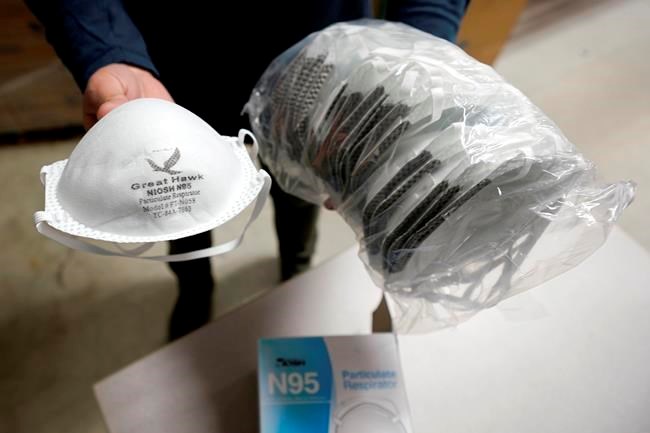MONTREAL — Quebec’s workplace safety board will require workers wear N95 masks in areas of health-care facilities where patients are COVID-19 positive, but one health expert says studies have indicated the benefits are unclear.
The safety board made the announcement Tuesday after months of pressure from nurses' unions for their members to have greater access to N95 masks — designed to have a close fit and to filter 95 per cent of very small particles. The new rule goes into effect Feb. 11.
Linda Lapointe, a vice-president at Quebec's largest nurses' union, said she's pleased with the decision but says N95 masks should also be worn in areas where patients are awaiting COVID-19 test results. Her union is suing the government to have those masks issued more widely among health-care workers.
"There's no doubt that they're better," she said. "The procedural mask is not a respiratory protection device, it's not in the class of the respiratory protection devices."
But Dr. Mark Loeb, professor of pathology and molecular medicine at McMaster University, says it's unclear whether N95 masks actually offer health-care workers more protection against COVID-19 than surgical masks. Loeb is conducting a study to find out.
That study, funded by the World Health Organization and the Canadian Institutes of Health Research, randomly assigns nurses in Ontario an N95 respirator or a surgical mask and then compares infection rates among the two groups.
It’s similar to a 2009 study he conducted comparing influenza infection rates among nurses issued N95s with nurses issued surgical masks, which showed "no difference," Loeb said. That study also analyzed seasonal coronaviruses — viruses that look similar under a microscope to COVID-19 — that cause respiratory illness.
“In that trial we found no difference between nurses who were randomized to the surgical mask compared to those who were randomized to N95 respirators,” Loeb said in a recent interview. “In fact, the infection rate was a little bit higher in those nurses who were randomized to the N95 respirator.”
That difference, however, was not statistically significant, he added.
A 2016 study by researchers at Public Health Ontario, the University of Toronto and the University of Ottawa — which looked at pre-existing research, including Loeb’s study — found that while N95 respirators had a “protective advantage over surgical masks in laboratory settings” it was unclear whether they were superior in clinical settings.
Quebec's workplace safety board said it made the decision to increase N95 mask use based on "new scientific knowledge."
But Dr. Leighanne Parkes, infectious disease specialist and microbiologist at Montreal's Jewish General Hospital, reacted to that decision Tuesday by stating, "there is no new evidence to support this change."
She said in an email it was a "bait and switch" designed to make health-care workers feel protected without addressing the real issues that are leading to outbreaks.
In a separate, recent interview, Parkes said, “Personal protective equipment is the very bottom of an inverted pyramid of protection."
She said infection-control measures such as sufficient space between patients and staff, proper ventilation and easy-to-clean surfaces play more of a role in preventing transmission than masks — surgical or N95.
In Quebec’s long-term care centres “you have the perfect coalescence of factors,” Parkes added. “You have old materials, poor ventilation, high density of individuals.”
Focusing on masks without addressing more important factors, she said, is like “putting construction workers in a construction site full of holes, without harnesses, without anything, but saying, ‘Oh, you have a hard hat on.’”
Lapointe said the nurses' union shares some of Parkes's concerns. The union, Lapointe added, is also challenging the government before the province's workplace administrative tribunal, seeking redress on N95 mask access and also on what she said is the lack of proper ventilation of health-care facilities.
Parkes, who does outbreak analysis as part of her job, warns that better masks might not prevent transmission among health-care workers because "some of our highest-risk moments are when we take off our mask," such as during coffee or eating breaks.
She said the majority of outbreaks among health-care workers aren't among people treating known COVID-positive patients — it's in settings where the outbreak is undetected.
Masks have become a symbol, Parkes said, one that may take attention away from the real problem. She said she worries that when the next pandemic happens, "we'll still be in the same place."
“What worries me is that while we're all focused on this, we're not going to make the changes we need to change to really prevent this from happening again in the future,” she said.
This report by The Canadian Press was first published Feb. 9, 2021.
———
This story was produced with the financial assistance of the Facebook and Canadian Press News Fellowship.
Jacob Serebrin, The Canadian Press



